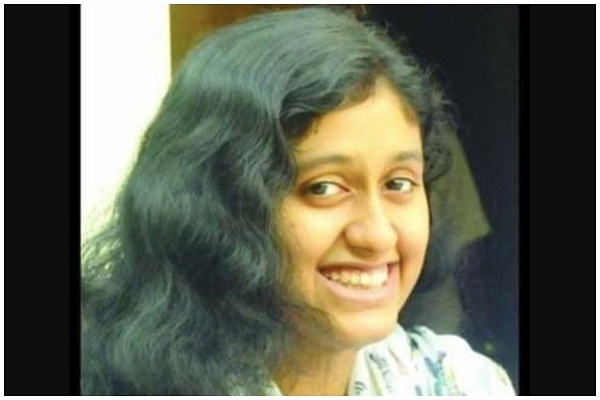
Death Of Fathima Latheef —Communalising A Suicide
A student named Fathima Latheef is reported to have committed suicide in IIT-Madras campus.
Social media, however, has been quick to communalise the issue as her alleged tormentors are professors with Hindu names.
It is important that a fair and impartial probe be conducted into the case and facts ascertained before tarnishing people and communities.
Fathima Latheef, a first-year student of of IIT-Madras, committed suicide by hanging from a ceiling fan in her hostel room last Saturday (9 November). Fathima was pursuing her five-year integrated MA programme in the Humanities and Development Studies department of the institute.
After initial investigation, the police stated that no suicide note was present. However, the image of an alleged ‘suicide note’ written by Fathima began to circulate on social media.
Fathima’s family members claimed that they have received a ‘suicide note’ from her phone in which she has mentioned the name of a professor as responsible her death. Fathima’s parents alleged that humiliation and caste discrimination by a faculty member had forced their daughter to take the extreme step.
“After reading the message and browsing her phone further, we were able to gather that my daughter was under constant harassment by one of her professors, who has hurt her dignity and it is the sole reason for her untimely death,” her father Abdul Latheef alleged.
Latheef also sought the help of Kerala Chief Minister Pinarayi Vijayan to ensure a fair probe into the circumstances leading to the student’s death. He alleged that Tamil Nadu police did not investigate the case properly.
The New Indian Express quoted a senior Chennai police officer, who is supervising the investigation in the case, as saying they were not aware of the allegations made by the student’s parents. A senior police officer said no one had access to her phone, indicating the “suicide note” could be fake.
According to a report in Maktoob Media (a media outfit run by Aslah Kayyalakkath, formerly associated with Al Jazeera ), the purported suicide note blames three faculty — Sudarsan Padmanabhan, Hemachandran Karah and Milind Brahme — as responsible for her suicide.
The Cognate, a portal which describes itself as ‘a digital news platform for Indian Muslim news, ideas, culture, and business’ published a provocatively titled article Taunted For Being Muslim, IIT Madras Student Commits Suicide, Blames Faculty. For this portal, it was enough that the victim was a Muslim and her alleged harassers had Hindu names.
Sections of social media took the communally-loaded narrative to the next level. With a typical ‘Brahminical’ name like ‘Sudarsan Padmanabhan’, the Hinduphobic elements on Twitter burst forth blaming ‘Sanghis’, ‘Brahminical hegemony’ and ‘Islamophobia’ for her suicide.
For instance, one handle alleged that ‘she committed suicide after facing religious and caste discrimination from her Professor Sudarshan Padmanabhan’. Another handle called it ‘institutional murder’ on minorities and blamed ‘Perpetuation of right wingers’.
Meanwhile, The South Asian Express, a Bengaluru-based ‘News and fact-checking website’ investigated the allegations and concluded:
It was also be noted that the academic year of 2019 had started just 4 months ago and the freshers including Fathima had not even completed a single semester to obtain the grades. Which makes the accusations completely baseless. It was also observed IIT Madras has Islamic Study circles and Catholic groups that conduct events and distribute fellowships exclusively for a specific community while there are none when it comes to Hinduism, Jainism or other religions.
Ajmal Hussain, a student of IIT Madras from Kerala, whom the South Asian Express quoted, cautioned social media warriors against jumping to conclusions. He tweeted:
He also revealed that the suicide was getting communally sensationalised in certain sections of the Malayalam media:
Going through the profile of each of those named in the suicide note, this writer found that none of them had any ideological relations to Hindutva. Nor have they faced accusations of Islamophobia in the past.
Prof. Sudarsan seems to be a classic case of how a typical stereotype is made of the enemy. Except for one instance of chairing a panel discussion during a Swadesi Indology conference, his larger and ideological association is clearly with the ‘academic liberals’ rather than Hindutvaites.
A book he co-edited on the construction of minorities in a democracy places him in the ‘liberal academia’ rather than the ideological insinuations he is subject to now. In his 2014 book introduction, he even acknowledges at face value the allegation of ‘Hindu terror’.
Earlier, he had published in the left-leaning quasi-academic journal Economic and Political Weekly (EPW) a paper where he alleged that correcting ‘depictions of ancient India in history school textbooks in California ... could tarnish its ideals of secularism.’
Milind Brahme, associate professor at the humanities and social sciences department of IIT-M, is a guiding force behind the notoriously Hinduphobic Ambedkar-Periyar Study Circle (APSC) and he later became the group's official academic adviser.
The allegations in the purported digital suicide note of the young scholar need to be fully investigated. If there is any truth in the allegation, then the problem is not Islamophobia but may involve individual abuse of their power and position, which is not uncommon in academia.
The allegations of the family members at a time of a traumatic loss should be completely understood in the context of their pain and hence, extra care and sensitivity should go to make sure that the social-media hate mongers, communal forces and political vested interests do not use this human tragedy for their recruitment.